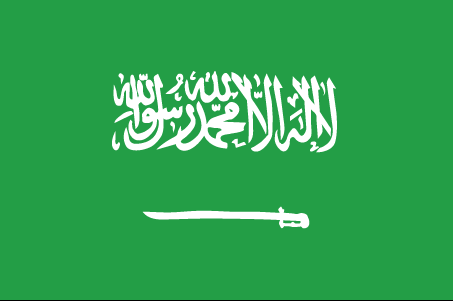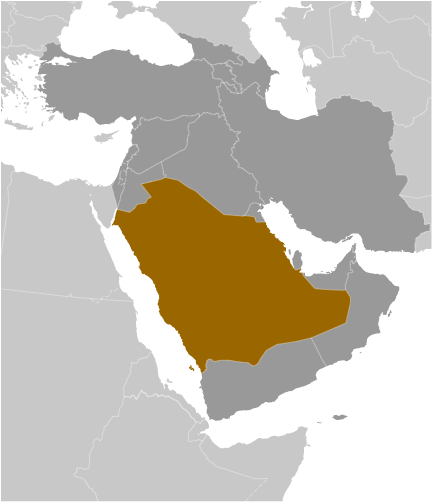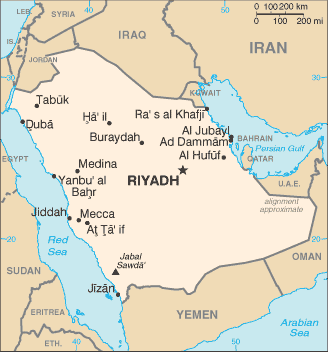Saudi Arabia is the birthplace of Islam and home to Islam's two holiest shrines in Mecca and Medina. The king's official title is the Custodian of the Two Holy Mosques. The modern Saudi state was founded in 1932 by ABD AL-AZIZ bin Abd al-Rahman Al SAUD (Ibn Saud) after a 30-year campaign to unify most of the Arabian Peninsula. A male descendent of Ibn Saud, his son ABDALLAH bin Abd al-Aziz, rules the country today as required by the country's 1992 Basic Law. Following Iraq's invasion of Kuwait in 1990, Saudi Arabia accepted the Kuwaiti royal family and 400,000 refugees while allowing Western and Arab troops to deploy on its soil for the liberation of Kuwait the following year. The continuing presence of foreign troops on Saudi soil after the liberation of Kuwait became a source of tension between the royal family and the public until all operational US troops left the country in 2003. Major terrorist attacks in May and November 2003 spurred a strong on-going campaign against domestic terrorism and extremism. King ABDALLAH has continued the cautious reform program begun when he was crown prince. To promote increased political participation, the government held elections nationwide from February through April 2005 for half the members of 179 municipal councils. In December 2005, King ABDALLAH completed the process by appointing the remaining members of the advisory municipal councils. The king instituted an Inter-Faith Dialogue initiative in 2008 to encourage religious tolerance on a global level; in February 2009, he reshuffled the cabinet, which led to more moderates holding ministerial and judicial positions, and appointed the first female to the cabinet. The country remains a leading producer of oil and natural gas and holds more than 20% of the world's proven oil reserves. The government continues to pursue economic reform and diversification, particularly since Saudi Arabia's accession to the WTO in December 2005, and promotes foreign investment in the kingdom. A burgeoning population, aquifer depletion, and an economy largely dependent on petroleum output and prices are all ongoing governmental concerns.
Country Name
Conventional long form:Kingdom of Saudi Arabia
Conventional short form:Saudi Arabia
Local long form:Al Mamlakah al Arabiyah as Suudiyah
Local short form: Al Arabiyah as Suudiyah
Government Type
monarchy
Capital
Name:Riyadh
Geographic coordinates:24 38 N, 46 43 E
Time difference:UTC+3 (8 hours ahead of Washington, DC during Standard Time)
Administrative divisions
13 provinces (mintaqat, singular - mintaqah); Al Bahah, Al Hudud ash Shamaliyah (Northern Border), Al Jawf, Al Madinah, Al Qasim, Ar Riyad (Riyadh), Ash Sharqiyah (Eastern), 'Asir, Ha'il, Jizan, Makkah, Najran, Tabuk
Independence
23 September 1932 (unification of the kingdom)
National Holiday
Unification of the Kingdom, 23 September (1932)
Constitution
governed according to Islamic law; the Basic Law that articulates the government's rights and responsibilities was promulgated by royal decree in 1992
Legal system
based on sharia law, several secular codes have been introduced; commercial disputes handled by special committees; has not accepted compulsory ICJ jurisdiction
Suffrage
21 years of age; male
Executive branch
Chief of state:King and Prime Minister ABDALLAH bin Abd al-Aziz Al Saud (since 1 August 2005); Heir Apparent Crown Prince SULTAN bin Abd al- Aziz Al Saud (half brother of the monarch); note - the monarch is both the chief of state and head of government
Head of government: King and Prime Minister ABDALLAH bin Abd al-Aziz Al Saud (since 1 August 2005); Deputy Prime Minister SULTAN bin Abd al-Aziz Al Saud; Second Deputy Prime Minister NAYIF bin Abd Al-Aziz Al Saud
Cabinet:Council of Ministers appointed by the monarch every four years and includes many royal family members
(For more information visit the World Leaders website)
Elections:none; the monarchy is hereditary; note - an Allegiance Commission created by royal decree in October 2006 established a committee of Saudi princes that will play a role in selecting future Saudi kings, but the system will not take effect until after Crown Prince Sultan becomes king
Legislative branch
Consultative Council or Majlis al-Shura (150 members and a chairman appointed by the monarch to serve four-year terms); note - though the Council of Ministers announced in October 2003 its intent to introduce elections for half of the members of local and provincial assemblies and a third of the members of the national Consultative Council or Majlis al-Shura incrementally over a period of four to five years, to date no such elections have been held or announced
Judicial branch
Supreme Council of Justice
Political Parties and Leaders
none
Political pressure groups and leaders
Ansar Al Marah (supports women's rights)
Other:gas companies; religious groups
International organization participation
ABEDA, AfDB (nonregional member), AFESD, AMF, BIS, FAO, G-20, G-77, GCC, IAEA, IBRD, ICAO, ICC, ICRM, IDB, IFAD, IFC, IFRCS, IHO, ILO, IMF, IMO, IMSO, Interpol, IOC, IOM (observer), IPU, ISO, ITSO, ITU, LAS, MIGA, NAM, OAPEC, OAS (observer), OIC, OPCW, OPEC, PCA, UN, UNCTAD, UNESCO, UNIDO, UNRWA, UNWTO, UPU, WCO, WFTU, WHO, WIPO, WMO, WTO
Diplomatic representation in the US
Chief of mission:Ambassador Adil al-Ahmad al-JUBAYR
Chancery:601 New Hampshire Avenue NW, Washington, DC 20037
Telephone:[1] (202) 342-3800
FAX:[1] (202) 944-3113
Consulate(s) general:Houston, Los Angeles, New York
Diplomatic representation from the US
Chief of mission:Ambassador James B. SMITH
Embassy:Collector Road M, Diplomatic Quarter, Riyadh
Mailing address:American Embassy, Unit 61307, APO AE 09803-1307; International Mail: P. O. Box 94309, Riyadh 11693
Telephone:[966] (1) 488-3800
FAX:[966] (1) 488-7360
consulate(s) general: Dhahran, Jiddah (Jeddah)
Flag description
green, a traditional color in Islamic flags, with the Shahada or Muslim creed in large white Arabic script (translated as "There is no god but God; Muhammad is the Messenger of God") above a white horizontal saber (the tip points to the hoist side); design dates to the early twentieth century and is closely associated with the Al Saud family which established the kingdom in 1932










